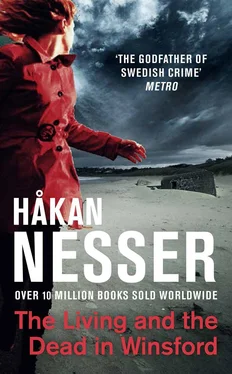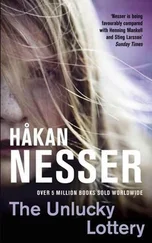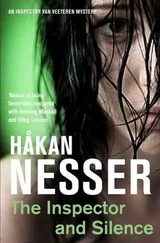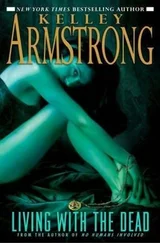Håkan Nesser - The Living and the Dead in Winsford
Здесь есть возможность читать онлайн «Håkan Nesser - The Living and the Dead in Winsford» весь текст электронной книги совершенно бесплатно (целиком полную версию без сокращений). В некоторых случаях можно слушать аудио, скачать через торрент в формате fb2 и присутствует краткое содержание. Год выпуска: 2013, Издательство: Mantle, Жанр: Криминальный детектив, на английском языке. Описание произведения, (предисловие) а так же отзывы посетителей доступны на портале библиотеки ЛибКат.
- Название:The Living and the Dead in Winsford
- Автор:
- Издательство:Mantle
- Жанр:
- Год:2013
- ISBN:нет данных
- Рейтинг книги:4 / 5. Голосов: 1
-
Избранное:Добавить в избранное
- Отзывы:
-
Ваша оценка:
- 80
- 1
- 2
- 3
- 4
- 5
The Living and the Dead in Winsford: краткое содержание, описание и аннотация
Предлагаем к чтению аннотацию, описание, краткое содержание или предисловие (зависит от того, что написал сам автор книги «The Living and the Dead in Winsford»). Если вы не нашли необходимую информацию о книге — напишите в комментариях, мы постараемся отыскать её.
The Living and the Dead in Winsford — читать онлайн бесплатно полную книгу (весь текст) целиком
Ниже представлен текст книги, разбитый по страницам. Система сохранения места последней прочитанной страницы, позволяет с удобством читать онлайн бесплатно книгу «The Living and the Dead in Winsford», без необходимости каждый раз заново искать на чём Вы остановились. Поставьте закладку, и сможете в любой момент перейти на страницу, на которой закончили чтение.
Интервал:
Закладка:
That first evening, only an hour after we had checked into the hotel, something took place that, looking back, I have interpreted as a sign. We had gone out for a little walk, and suddenly found ourselves outside a police station. I must have suffered some kind of shock as I found myself standing there outside the entrance, unable to move. I just stood there with Castor by my side, feeling that the imposing buildings were leaning over us and threatening to collapse on top of us. The noises of the city were magnified in my ears to form a bewildering cacophony, but after a few seconds they died away and instead I heard a voice inside my head intoning: It’s not yet too late. He’s still alive. You can go in through that green door and put everything to rights .
And without a second thought I walked up the three steps and opened the door, with Castor at my heels. We came into some sort of reception area, and were immediately confronted by a stern woman in a uniform who informed me that it was not allowed to take a dog with me into the police station. For some reason I couldn’t understand she was holding a stethoscope in her hand. Surely police officers don’t normally use stethoscopes?
I hesitated for a second, then apologized and left together with Castor.
We continued our walk, and a quarter of an hour later were back in our hotel room. I enjoyed a night’s dreamless sleep, and when I woke up early the next morning I felt like an overture.
Or perhaps that’s just a peculiar thought I had. It’s presumably not possible to feel like an overture.
The Albrechtshof was just over a kilometre from the Tiergarten, and we spent several hours roaming around this attractive park, making necessary decisions. The weather was mild and pleasant all the time — not much in the way of sunshine, but no rain. It was the first time I had been in Berlin for many years, and what I remembered now was my very first visit to that troubled city. It was in May 1973, six months before Gunsan died; and in charge of us was our much admired form master and Swedish teacher, known affectionately as the Beanpole. The whole class was there, with not a single pupil missing: twenty-eight fifteen- or sixteen-year-olds, plus the Beanpole and a couple of parents. It was three weeks before we left our secondary school and some of us proceeded to sixth-form college, and we scurried around like scalded cats, visiting various museums, cafes and monuments, stared in bewilderment and horror at the Wall and passed through Checkpoint Charlie, scribbled our names on walls at the Zoo railway station, shopped at KaDeWe and tried to speak German even among ourselves.
And we visited Tiergarten, then as now. Fifteen years old then, fifty-five now. It seemed to me that the park was more or less unchanged. I decided that life was short, and said as much to Castor at regular intervals. Life is short, a dog’s life even shorter. We sat on a park bench and ate a curry wurst. What shall we do with the time we have left? I asked my dog. Eat more German sausages was his suggestion — I could see that just by looking at him, and it seemed to me that I was now seeing the world as it really was. For the first time. I burst out laughing: it soon passed, but that was a moment when the sun came out from behind a cloud and I started laughing, there on a bench in Tiergarten.
The first decision I made was not to go back to Sweden. Going back to a familiar environment, making up some kind of story about Martin having disappeared, directing my sorrowful steps back to the Monkeyhouse. . No, that felt like an utter impossibility, and I didn’t spend many minutes thinking about it.
The second decision was just as straightforward: we would not continue to Morocco. I had never set foot in that country, there was nobody and nothing awaiting us there, and I had no illusions about the prospects of a solitary woman with a dog being able to establish a foothold there.
So what was the alternative? The alternative was to find a suitable place in Europe in which to spend the winter. A suitable country. It was distinctly possible of course that I might have a nervous breakdown, I was the first to acknowledge that. Everything could very easily go to hell, but while waiting for that day and that moment to arrive I couldn’t simply sit on a park bench in Tiergarten and eat sausages. Sorry, Castor.
And so there were a number of practical details to be attended to. It was vital that I didn’t leave behind any traces that could be followed up. I mustn’t allow use of my credit card and mobile telephone to betray routes and stopping places. In case somebody came looking for us — the police, or a husband who had somehow managed to find a way out of the bunker.
During the days spent in Berlin I became increasingly unsure of how I judged the latter possibility. I had no clear idea of how long a person can survive without food and water, but I assumed his worst enemy would be the cold. I recalled having read that some people had survived for more than a fortnight without water, perhaps as long as a month, but they had been isolated in temperate conditions. What was the temperature in the bunker? Hardly more than seven or eight degrees, I estimated, and of course it would get much colder at night.
I tried to refrain from thinking about what role the rats might play — but surely they must have had some way of getting in and out? Or did they use the apertures facing the sea? I was sure they were too small for a grown adult, but of course they were big enough for a rat.
Anyway, what were the realistic chances of a man being able to get out?
How likely was it that some walker would come past and hear somebody crying for help?
And how likely was the other scenario — that the police would start looking for Castor and me? If somebody found a dead body in a bunker on the Polish Baltic coast, how would they go about discovering who it was?
No identification documents. No mobile. Did Martin have anything in his pockets that could indicate Sweden? I didn’t know. But in any case the fifty-year-old literary colossus Martin Holinek from Sweden had not been reported missing, and his fingerprints and DNA were not in any register. Unless of course the police had taken his prints that day when he was being interrogated on suspicion of rape. I didn’t know. How could I? Would some kind of suspicion crop up in the head of Professor Soblewski if he read in his local newspaper about a macabre discovery on a remote beach? There was surely no reason to fear that it would. Or was there?
Good questions, perhaps. But as early as my third day in Berlin I decided to regard them as irrelevant. The answers had nothing to do with my strategies for the future, and I needed to plan and act as if everything was under control. Whatever happened outside my horizons did not affect our circumstances — Castor’s and my circumstances, that is. Make the best of the situation, that was all that mattered, and keep plugging away.
I realized quite quickly that I had a cool, logical brain, and concluded that it was largely because I wasn’t in a hurry. Despite everything, I wasn’t being hounded, wasn’t under stress. There was time to analyse and ponder upon every step and every measure, and if I were to decide that I needed more time there was nothing to prevent me from extending our stay at the hotel for a few days. In any case, Berlin would be the last place where I left any trace of my presence, I made my mind up about that. The last place where I used any of our credit cards, and the place where I finally switched off our mobile phones. All the newfangled inventions that were so easy to track down.
The fact that I would have to keep on using our car was possibly a complication, but stealing another car or trying to change the registration plates seemed to be quite simply out of the question. If I had murdered a president or a prime minister I would probably have considered such actions, but I wasn’t guilty of such crimes after all.
Читать дальшеИнтервал:
Закладка:
Похожие книги на «The Living and the Dead in Winsford»
Представляем Вашему вниманию похожие книги на «The Living and the Dead in Winsford» списком для выбора. Мы отобрали схожую по названию и смыслу литературу в надежде предоставить читателям больше вариантов отыскать новые, интересные, ещё непрочитанные произведения.
Обсуждение, отзывы о книге «The Living and the Dead in Winsford» и просто собственные мнения читателей. Оставьте ваши комментарии, напишите, что Вы думаете о произведении, его смысле или главных героях. Укажите что конкретно понравилось, а что нет, и почему Вы так считаете.












